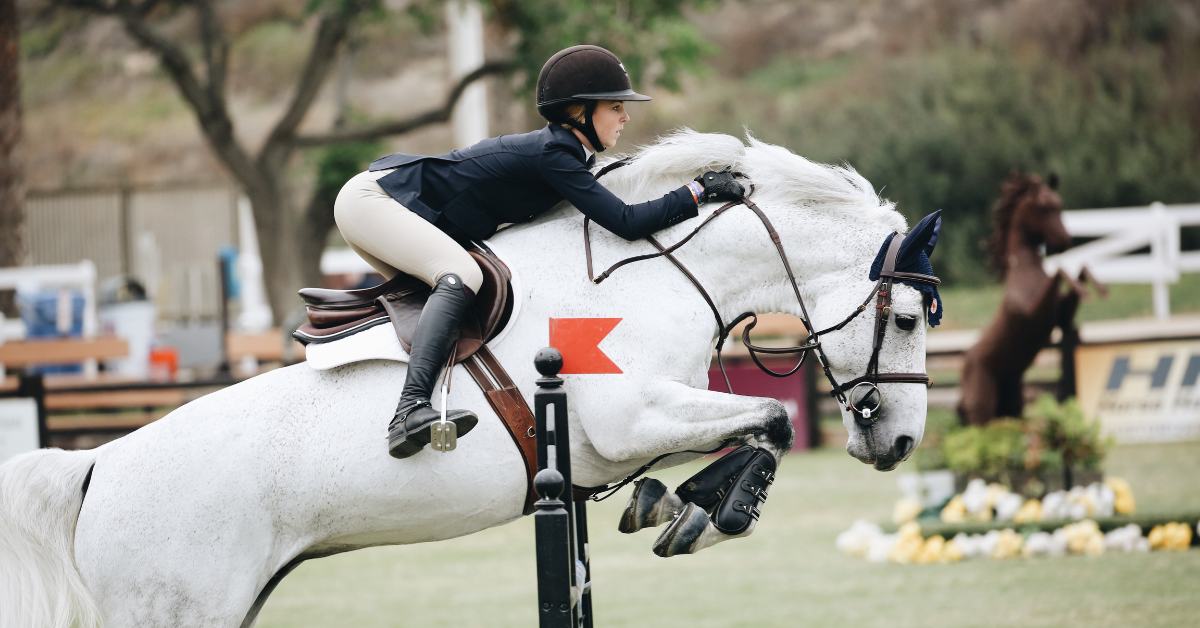Stress at outdoor competitions: help your horse through the summer!
Flapping flags, prams, chip stalls, birds flying up, motorbikes passing by, a scary jury box or a shiny car next to the ring regularly cause tension in competition horses in the outdoor season. Not every combination can deal with this equally well and it affects performance. Fortunately, there are several methods to reduce stress in horses. With training, minerals and herbs.
Magnesium
Stress

14 May '25 • 3 min reading time
From April 1st, the outdoor season begins. And although you can still compete indoors in some places, in summer you’ll usually need to head outside if you want to ride tests or jump courses. Not every horse-and-rider combination handles this equally well. So how do you help your competition horse get through the summer as relaxed as possible?
Stress in Horses
There are various causes of stress at outdoor competitions: transport, changes in feeding times, a tense or ambitious rider... For a flight animal like a horse, these are all signals that something’s not right and that they need to be alert. Their eyes widen, heart rate rises, and breathing speeds up. Your horse becomes a bundle of adrenaline, ready to flee even before you’ve mounted. And if there’s a red chair next to the arena or a dog suddenly walks past the white fencing, instead of changing reins in medium walk from B to H, you might find yourself galloping full speed toward the exit! Clearly, that’s not what you want.
Shut Down
Stress doesn’t always manifest as a dramatic flight reaction. Some horses shut down completely when they become nervous. They barely respond to aids and become very slow and unresponsive. It becomes nearly impossible to ride, which can be incredibly frustrating—especially when everything goes smoothly at home. This behavior often isn’t recognized as stress, but it usually is.
Preventing Tension in Horses
As a rider, you can do a lot to help your horse manage stress. Stay calm, speak in a normal tone, and remember to breathe. Reassure your horse and give it a moment to calmly observe its surroundings. Good desensitization training can teach a horse to handle unexpected situations and is also useful in preparation for the outdoor season. Groundwork can also help a horse to relax. Additionally, make sure your horse doesn’t have a magnesium deficiency and consider supporting it with an herbal supplement in the lead-up to a show or stressful moment.
Magnesium for Stress
Many people give their horses magnesium to reduce stress. Magnesium is a mineral that’s crucial for the nervous system and muscles. It’s not always present in sufficient amounts in feed. Most sport feeds contain enough magnesium, but if your horse mainly gets low-nutrient hay and basic feed, supplementing magnesium could be worthwhile. Keep in mind that it takes a few weeks for magnesium to take full effect—it’s not something you can give an hour or a day before the show. Magnesium helps make your horse more resilient to stress by enabling it to release tension more effectively. It’s important to balance magnesium and calcium in the diet. If you're feeding high levels of calcium, additional magnesium may not be absorbed properly. The form of magnesium also matters. Cheaper supplements often use magnesium oxide or magnesium sulfate—forms that are poorly absorbed in the gut. Studies show that magnesium chelate (an organic form) and magnesium citrate are better absorbed, so you need less of them. When combined with vitamin B6, magnesium chelate works optimally.
Herbs for Horses with Show Stress
If your horse no longer has a magnesium deficiency but is still nervous during competitions, herbs may provide further support. The difference between magnesium and herbal supplements is that magnesium replenishes a deficiency and strengthens the nervous system. If the nervous system is functioning well but your horse still shows stress, herbs can help. They have a calming effect and improve focus. However, there are some things to keep in mind. Valerian, often used in calming herbal blends, is on the doping list and should not be given before competitions. St. John’s wort can interfere with medications, so it’s best avoided if your horse is being treated for issues like hormonal imbalances or stomach problems. Chamomile, passionflower, sunflower, red clover, thyme, hops, and chasteberry are herbs commonly used for stress and are not on the doping list. These herbs reduce stress while keeping your horse alert enough to perform. They don’t sedate or dull your horse. A course of herbal extract, started a few days before a competition, can help prevent stress and prepare your horse optimally for what’s ahead.


